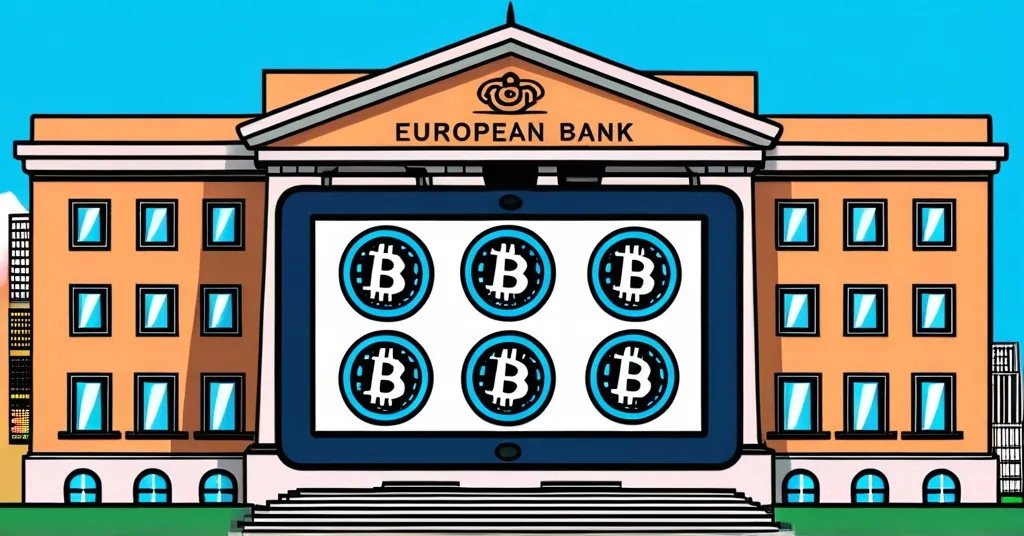Garanti BBVA Kripto Launches Crypto Trading in Europe with Bit2Me

Garanti BBVA Kripto: Turkey’s Leading Bank to Launch Crypto Trading Services in Europe
Is Europe ready for a banking revolution? Garanti BBVA Kripto thinks so, and they’re bringing crypto trading to the continent through a strategic partnership with Bit2Me. This move by Turkey’s fifth largest bank, backed by BBVA, could signal a broader trend of European banks embracing digital assets, despite the shifting regulatory landscape.
- Garanti BBVA Kripto launches crypto trading in Europe
- Partnership with Bit2Me, a Spanish crypto exchange
- Turkey’s regulatory environment shifts towards stricter AML measures
- BBVA’s significant stake in Garanti Bank drives initiative
- Predictions of increased European bank involvement in crypto
Garanti BBVA Kripto, a new service from Garanti BBVA, has chosen Bit2Me as its gateway to the European crypto market. Bit2Me, with over a decade of experience and a commitment to regulatory compliance, is seen as the perfect partner to bridge traditional banking with the burgeoning crypto market. This partnership isn’t just a business move; it’s a testament to the evolving relationship between banks and crypto exchanges. Bit2Me’s robust infrastructure and adherence to regulations make it an ideal ally for Garanti BBVA’s foray into digital assets.
Turkey’s regulatory environment has played a significant role in this development. Initially known for its relaxed approach to crypto regulation, Turkey has recently introduced new Anti-Money Laundering (AML) measures, effective from February 25, 2025. These rules, requiring identifying information for transactions over 15,000 Turkish lira ($425), aim to prevent illegal money movements but may impact the ease of crypto transactions. While these regulations could pose challenges, they also reflect a maturing market that seeks to balance innovation with security.
BBVA, holding an 86% stake in Garanti Bank, is not just a financial backer but a strategic force pushing for the integration of crypto into traditional banking. This move reflects a broader trend of banks embracing the future of finance, despite the challenges posed by shifting regulations. BBVA’s involvement signals a confidence in the potential of cryptocurrencies to revolutionize financial services.
The broader European banking scene is also catching the crypto bug. Giants like Deutsche Bank and Société Générale are exploring digital assets, driven by the clear regulatory framework provided by the Markets in Crypto-Assets Regulation (MiCA), implemented on December 30, 2024. MiCA offers banks a safer harbor to navigate the crypto waters, potentially leading to increased mainstream adoption. This regulatory clarity is a game-changer, enabling banks to confidently enter the crypto space.
While Turkey’s crypto market is robust, boasting a trading volume of $170 billion as of September 2023, the new AML regulations could pose hurdles. Crypto enthusiasts should be wary of overhyping the potential, as regulatory shifts can impact the ease of transactions and the overall crypto landscape. Yet, the optimism around crypto adoption remains high, with Abel Peña, head of sales at Bit2Me, predicting that more European banks will jump on the crypto trading bandwagon in the first quarter of this year. This forecast aligns with Bit2Me’s ambitious plan to collaborate with over 50 financial institutions, aiming to launch their crypto products in 2025.
“Abel Peña, the head of sales at Bit2Me, forecasts that more European banks will begin offering crypto trading services in the first quarter of this year.”
Despite these promising developments, it’s crucial to consider potential counterpoints. Critics might argue that integrating traditional banking with cryptocurrencies could lead to increased centralization, which goes against the ethos of decentralization that many crypto advocates champion. Additionally, the volatility of cryptocurrencies remains a concern, potentially affecting the stability of banks venturing into this space.
Yet, the potential benefits cannot be ignored. Cryptocurrencies like Bitcoin offer the promise of financial freedom and a disruption of the status quo. They represent a powerful tool for promoting decentralization and privacy, aligning with the principles of effective accelerationism (e/acc). As we navigate this evolving space, it’s a dance between innovation and regulation, with each step forward bringing both opportunities and obstacles. Looks like Garanti BBVA is banking on crypto to make a big splash in Europe!
The significant inflow of $35 billion into U.S. bitcoin funds indicates strong market demand, which could encourage European banks to expedite their crypto service offerings. This market demand, coupled with the regulatory clarity provided by MiCA, could pave the way for a new era of banking that embraces the potential of digital assets.
Here are some key takeaways and questions to consider:
- What is Garanti BBVA Kripto?
Garanti BBVA Kripto is a new service from Garanti BBVA, Turkey’s fifth largest bank, to launch cryptocurrency trading in Europe in collaboration with the Spanish crypto exchange Bit2Me.
- How does Turkey’s regulatory environment contribute to this development?
Turkey’s once relaxed approach to crypto regulation has facilitated the launch of Garanti BBVA Kripto, though new AML regulations could impact future operations.
- What role does BBVA play in this initiative?
BBVA, with its 86% stake in Garanti Bank, is a major player in the development and launch of Garanti BBVA Kripto, pushing the boundaries of traditional banking into the crypto realm.
- What are the predictions for European banks’ involvement in crypto trading?
Abel Peña from Bit2Me predicts a surge in European banks offering crypto trading services in the first quarter of the current year, reflecting a broader trend towards mainstream crypto adoption.



